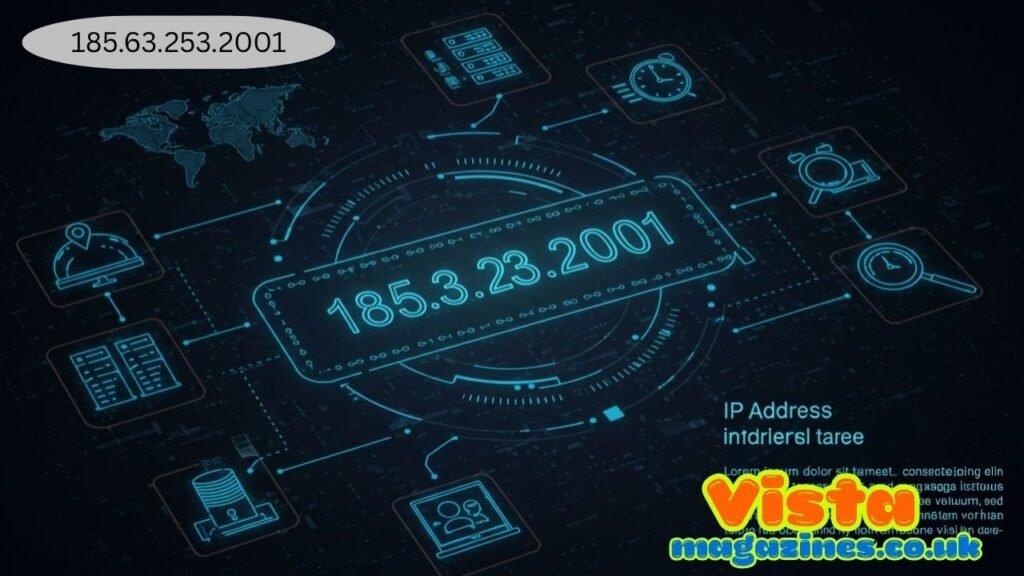185.63.253.2001 – Understanding the IP Address, Its Purpose, and Online Impact

Introduction to 185.63.253.2001
In the vast world of the internet, numbers like 185.63.253.2001 often appear mysterious or technical to the average user. However, every IP address — including this one — plays a critical role in enabling online communication, connectivity, and data transfer. Whether you’re browsing a website, sending an email, or streaming a video, an IP address is what allows your device to communicate with servers across the world.
185.63.253.2001 is an example of a structured Internet Protocol (IP) address used for routing and identification purposes. Understanding its significance requires delving into what IP addresses are, how they function, and why specific IPs like this one may appear in logs, trackers, or server records.
In this article, we’ll take a detailed look at 185.63.253.2001, its structure, potential uses, network functionality, and importance in cybersecurity, networking, and data management.
What Is an IP Address?
An IP address (Internet Protocol address) is a unique numerical label assigned to each device connected to a computer network that uses the Internet Protocol for communication. Think of it as a digital address that helps route information to and from devices.
There are two main types of IP addresses in use today — IPv4 and IPv6. The format 185.63.253.2001 resembles an IPv4 address, but it contains an extra numerical segment, which suggests that it could be a typographical variation or placeholder used in certain network configurations. Typically, an IPv4 address has four segments (each ranging from 0 to 255), while IPv6 addresses are longer and written in hexadecimal form.
Nonetheless, for analytical purposes, addresses like 185.63.253.2001 help illustrate how data routing and IP identification work in digital infrastructure.
How IP Addresses Work

When you type a web address into your browser — say, www.example.com — your computer doesn’t communicate using that domain name directly. Instead, it connects to the corresponding IP address through the Domain Name System (DNS).
Every website, email server, and connected device has a unique IP. This system ensures that your data packets — small chunks of information — reach the correct destination.
If 185.63.253.2001 were an active IP, it would identify a specific server or device in a network, allowing routers to forward data accurately. Without this system, internet communication as we know it would be impossible.
Possible Origins and Uses of 185.63.253.2001
IP addresses like 185.63.253.2001 often belong to Internet Service Providers (ISPs), hosting companies, or corporate networks. They may represent a web server, mail server, proxy, or even a virtual machine running in a cloud data center.
Here are a few common uses:
- Web Hosting: Websites are stored on servers that have unique IPs.
- VPN or Proxy Services: Some IPs belong to providers offering private browsing or data masking.
- Data Centers: Cloud platforms like AWS, Google Cloud, or Azure allocate IP ranges to users.
- Security and Monitoring: IP addresses are often logged for security analysis or network management.
If 185.63.253.2001 appears in network logs, it may have been involved in communication between devices or connected to a specific online service.
Network Identification and Geo-location
Every public IP can often be traced back to a region, country, or network provider using geo-IP tools. These tools rely on public databases to determine where a particular IP is registered.
For example, an IP like 185.63.253.2001 might point to a European or Asian data center, depending on its registration details. Geo-location is commonly used for content delivery, fraud detection, and regulatory compliance.
While such tools don’t reveal personal information, they can identify the approximate physical location of the server or its network provider.
The Importance of IP Address Management
Managing IP addresses like 185.63.253.2001 is crucial for businesses and organizations. IP Address Management (IPAM) helps track and organize network resources to prevent duplication, ensure security, and maintain efficiency.
Companies often use automated tools to manage IP pools, assign addresses dynamically, and detect unauthorized devices. A single misconfigured IP address can cause service disruptions, data loss, or security vulnerabilities.
That’s why systematic IP management is an essential aspect of modern IT infrastructure.
Security and Privacy Implications
In cybersecurity, every IP address — including 185.63.253.2001 — is a potential point of interest. Attackers often exploit IPs to identify network weaknesses, while defenders use IP analysis to detect intrusions or unusual traffic patterns.
Monitoring tools and firewalls continuously log IP activities to identify suspicious behavior. For example, if an unknown IP repeatedly attempts to access a restricted server, it may be flagged as a potential threat.
Conversely, legitimate IPs are used for communication between trusted devices, ensuring that data travels securely.
Privacy is also a concern. Many users employ Virtual Private Networks (VPNs) to hide their real IPs, protecting their identity from tracking and data collection.
Static vs. Dynamic IP Addresses
An IP like 185.63.253.2001 could either be static or dynamic, depending on its configuration.
- Static IP: Permanently assigned to a single device or server. Common for web hosting or corporate networks.
- Dynamic IP: Assigned temporarily by ISPs; changes every time a device reconnects to the network.
Static IPs are easier to track but offer better stability for online services. Dynamic IPs enhance privacy but can make consistent connections more difficult.
How IP Addresses Are Logged and Tracked
Whenever you visit a website, your IP address is recorded in server logs. These logs help website administrators monitor traffic, detect errors, and prevent malicious activities.
If 185.63.253.2001 appears in analytics or logs, it indicates a communication event — either an incoming request or outgoing data exchange. Logs typically store timestamps, IPs, and user-agent details (like browser type or OS).
In cybersecurity investigations, IPs play a key role in tracing digital footprints and identifying patterns of attacks or unauthorized access.
The Role of IPs in Networking and Infrastructure
Every network — from small offices to global corporations — relies on IP addresses to maintain seamless communication.
In enterprise setups, private IP ranges are used internally, while public IPs connect the organization to the wider internet. Tools like DHCP (Dynamic Host Configuration Protocol) automatically assign IPs to devices, preventing conflicts and optimizing network performance.
If an address like 185.63.253.2001 were part of such a network, it would act as a node or endpoint facilitating communication.
Misconceptions About IP Addresses

Many people mistakenly believe that IP addresses directly identify individuals. In reality, IPs represent devices or connections, not specific people.
For instance, multiple users behind a shared Wi-Fi network will appear under a single public IP. Similarly, cloud-based applications can use shared IPs across different clients.
Therefore, while an address like 185.63.253.2001 can identify a network or service, it doesn’t reveal private user data on its own.
The Evolution from IPv4 to IPv6
As internet usage expanded, the number of available IPv4 addresses began to run out. To solve this, IPv6 was introduced, offering a vastly larger address space.
IPv4 addresses, such as 185.63.253.2001, typically follow the xxx.xxx.xxx.xxx format. IPv6, however, uses a hexadecimal system (e.g., 2001:0db8:85a3:0000:0000:8a2e:0370:7334), enabling trillions of unique combinations.
This transition ensures that future networks, smart devices, and IoT systems can all function without running out of unique identifiers.
The Future of IP Technology
As global connectivity grows, IP addresses will continue to evolve alongside emerging technologies. AI-driven IP management, smarter firewalls, and advanced routing systems will make the internet faster, safer, and more efficient.
Even though specific numbers like 185.63.253.2001 may seem insignificant, they represent the backbone of global communication. Every message, transaction, and data packet relies on this invisible yet indispensable technology.
Conclusion
185.63.253.2001 exemplifies the critical role of IP addresses in connecting the digital world. Whether it’s routing data, managing servers, or enhancing cybersecurity, each IP contributes to the seamless operation of the internet.
Understanding IP addresses helps demystify how the web functions — from the moment you open a webpage to the instant a message reaches its destination. In the age of digital transformation, these numbers are far more than technical labels; they are the invisible highways that power modern life online.



